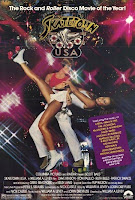 A feeling of misguided satisfaction coursed through my nimble frame as I finished watching Skatetown, U.S.A., a non-stop disco party that repeatedly shuns reality and subverts the conventions of modern cinema. Why such an extreme reaction to something that, on the surface, appears to be stupid and trivial? Well, I like to brag about the fact that I enjoy watching Roller Boogie, the movie where Linda Blair‘s gorgeous thighs are constantly being strangled by a pair of purple tights, and Xanadu, which is also a “movie,” except in this one, Olivia Newton-John provides the bulk of the thigh-candy. As you would expect, or maybe you wouldn’t, what the hell do I know, the weird look of pity/puzzlement they give me as I’m telling them all about my love for these culturally important movies bathes my fragile aura with radiant waves of energy nectar. Only problem being is that I’m deathly afraid that one day one of these fine, nectar-providing folks is gonna ask me if I’ve seen Skatetown, U.S.A. You see, saying you’re a fan of movies that involve disco and roller skating is completely meaningless if you haven’t seen Skatetown, U.S.A., the kind of movie where yo-yos, rainbow suspenders, tai chi and short shorts all appear within the same frame. It’s like saying you’re a fan of the music of Nitzer Ebb but haven’t heard That Total Age. In case it isn’t obvious yet, I’d like to officially announce that my days of nervously boasting about my love of roller disco movies are over, for I have been to Skatetown, U.S.A., and let me be the first to tell you, it was glorious.
A feeling of misguided satisfaction coursed through my nimble frame as I finished watching Skatetown, U.S.A., a non-stop disco party that repeatedly shuns reality and subverts the conventions of modern cinema. Why such an extreme reaction to something that, on the surface, appears to be stupid and trivial? Well, I like to brag about the fact that I enjoy watching Roller Boogie, the movie where Linda Blair‘s gorgeous thighs are constantly being strangled by a pair of purple tights, and Xanadu, which is also a “movie,” except in this one, Olivia Newton-John provides the bulk of the thigh-candy. As you would expect, or maybe you wouldn’t, what the hell do I know, the weird look of pity/puzzlement they give me as I’m telling them all about my love for these culturally important movies bathes my fragile aura with radiant waves of energy nectar. Only problem being is that I’m deathly afraid that one day one of these fine, nectar-providing folks is gonna ask me if I’ve seen Skatetown, U.S.A. You see, saying you’re a fan of movies that involve disco and roller skating is completely meaningless if you haven’t seen Skatetown, U.S.A., the kind of movie where yo-yos, rainbow suspenders, tai chi and short shorts all appear within the same frame. It’s like saying you’re a fan of the music of Nitzer Ebb but haven’t heard That Total Age. In case it isn’t obvious yet, I’d like to officially announce that my days of nervously boasting about my love of roller disco movies are over, for I have been to Skatetown, U.S.A., and let me be the first to tell you, it was glorious.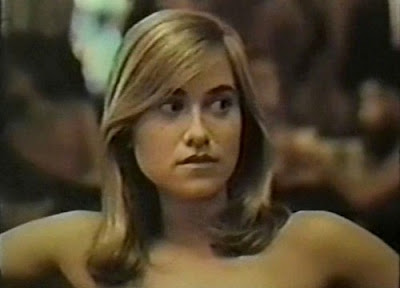 The act of gliding on wheels to disco music, as supposed to walking to the screeching racket that is rock music, has always been the principal allure of roller disco cinema. When riding in a car or traveling across town on a bus, you feel as if your moving but there’s a bit of a disconnect. On the other hand, when the wheels are actually attached to your body, the sensation is more tactile, more granular. Add the synthetic pulse of a well-oiled disco beat, and we’re talking some serious harmony up in here.
The act of gliding on wheels to disco music, as supposed to walking to the screeching racket that is rock music, has always been the principal allure of roller disco cinema. When riding in a car or traveling across town on a bus, you feel as if your moving but there’s a bit of a disconnect. On the other hand, when the wheels are actually attached to your body, the sensation is more tactile, more granular. Add the synthetic pulse of a well-oiled disco beat, and we’re talking some serious harmony up in here.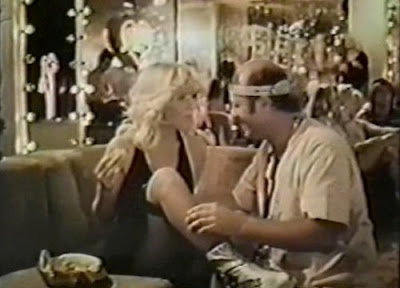 Just because walking and talking is the most popular way to depict two people in a relationship on-screen doesn’t mean it’s the most effective. Having your characters on wheels not only enhances the romance, it accelerates the wooing process. Take a couple who do things the old fashioned way: they walk to a restaurant, they eat, they engage in small talk, it can be quite tedious. Now take a roller skating couple, like, for instance, Stanley and Allison, the couple in Skatetown, U.S.A. played by Greg Bradford (Zapped!) and Katherine Kelly Lang (The Bold and the Beautiful), the two barely say a word to one another, yet their chemistry on the roller disco dance floor is undeniable. There is just something to said about love when it’s on wheels. It blossoms in a way that no walking person could ever understand.
Just because walking and talking is the most popular way to depict two people in a relationship on-screen doesn’t mean it’s the most effective. Having your characters on wheels not only enhances the romance, it accelerates the wooing process. Take a couple who do things the old fashioned way: they walk to a restaurant, they eat, they engage in small talk, it can be quite tedious. Now take a roller skating couple, like, for instance, Stanley and Allison, the couple in Skatetown, U.S.A. played by Greg Bradford (Zapped!) and Katherine Kelly Lang (The Bold and the Beautiful), the two barely say a word to one another, yet their chemistry on the roller disco dance floor is undeniable. There is just something to said about love when it’s on wheels. It blossoms in a way that no walking person could ever understand.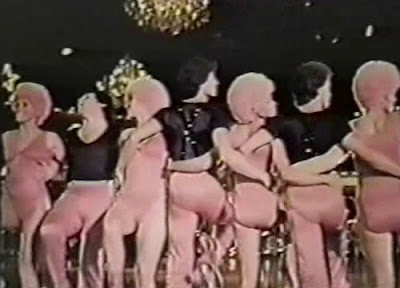 Since I’ve already done an excellent job proving that moving on wheels to disco gives you a sense of spiritual autonomy and vastly improves your love life, I’d like to talk about this particular film and its radical approach to storytelling. Written Nick Castle (Escape from New York) and directed by William A. Levey (Wam Bam Thank You Spaceman), Skatetown, U.S.A. bypasses things like scripted dialogue and character development all together, and aims to create a universe that seems lived in, but not in a way that seems contrived or phony.
Since I’ve already done an excellent job proving that moving on wheels to disco gives you a sense of spiritual autonomy and vastly improves your love life, I’d like to talk about this particular film and its radical approach to storytelling. Written Nick Castle (Escape from New York) and directed by William A. Levey (Wam Bam Thank You Spaceman), Skatetown, U.S.A. bypasses things like scripted dialogue and character development all together, and aims to create a universe that seems lived in, but not in a way that seems contrived or phony.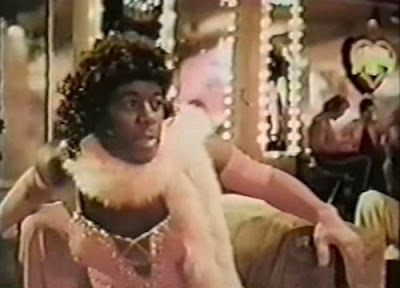 The sight of hordes of scantily clad roller skaters rolling along the concrete pathways of Venice Beach in the opening scene is the only proof we have that this film takes place on Planet Earth, because after that, the film takes place entirely inside the iridescent realm that is Skatetown, U.S.A., an awe-inspiring roller disco paradise run by a father and son duo named Harvey (Flip Wilson) and Jimmy (Billy Barty); the former, by the way, also plays Harvey’s mother (yeah, that’s right, Flip Wilson appears in drag). Under the spell of The Wizard (Denny Johnston), the joints giant white afro-sporting DJ, we are subjected to a balletic display of tightly packaged disco crotches, flashing disco lights, glowing disco balls, pulsating disco beats, and knee-molesting disco doctors.
The sight of hordes of scantily clad roller skaters rolling along the concrete pathways of Venice Beach in the opening scene is the only proof we have that this film takes place on Planet Earth, because after that, the film takes place entirely inside the iridescent realm that is Skatetown, U.S.A., an awe-inspiring roller disco paradise run by a father and son duo named Harvey (Flip Wilson) and Jimmy (Billy Barty); the former, by the way, also plays Harvey’s mother (yeah, that’s right, Flip Wilson appears in drag). Under the spell of The Wizard (Denny Johnston), the joints giant white afro-sporting DJ, we are subjected to a balletic display of tightly packaged disco crotches, flashing disco lights, glowing disco balls, pulsating disco beats, and knee-molesting disco doctors.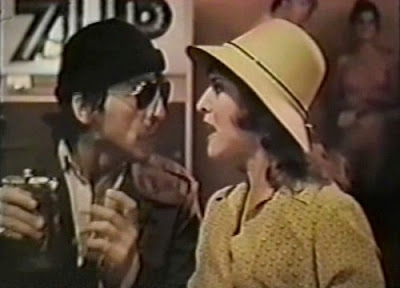 You’d think the film would rest on its laurels by employing the tried and true roller disco movie formula: montage, dialogue, montage, a brief shot of Ruth Buzzi in a yellow hat, dialogue, montage. After all, it worked so brilliantly in Roller Boogie. However, Skatetown, U.S.A. takes the formula one step further by eliminating the dialogue completely. Oh, sure, there’s still a ton of dialogue uttered in the film (most of it incoherent nonsense), it’s just that it seemed like I was watching a 98 minute montage. Which, if you think about it, is more attune to reality. If you think about it some more, there’s no dialogue in real life, so why should there be any in the movies?
You’d think the film would rest on its laurels by employing the tried and true roller disco movie formula: montage, dialogue, montage, a brief shot of Ruth Buzzi in a yellow hat, dialogue, montage. After all, it worked so brilliantly in Roller Boogie. However, Skatetown, U.S.A. takes the formula one step further by eliminating the dialogue completely. Oh, sure, there’s still a ton of dialogue uttered in the film (most of it incoherent nonsense), it’s just that it seemed like I was watching a 98 minute montage. Which, if you think about it, is more attune to reality. If you think about it some more, there’s no dialogue in real life, so why should there be any in the movies?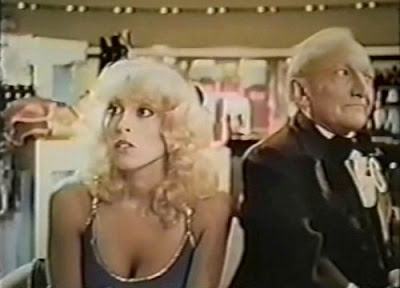 Seriously, forget about even a sentence, when was the last time you heard someone verbalize actual words in order to advance a plot? For me, you’d have to go all the way back to the late 1970s, and I wasn’t even alive back then.
Seriously, forget about even a sentence, when was the last time you heard someone verbalize actual words in order to advance a plot? For me, you’d have to go all the way back to the late 1970s, and I wasn’t even alive back then.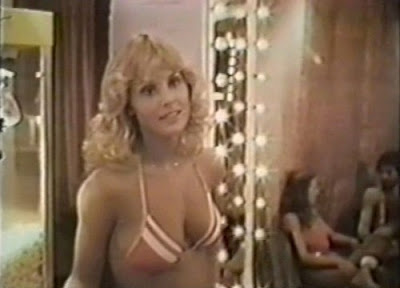 There was one line of dialogue expressed audibly in the film that I do remember, and that was Dorothy Stratten‘s “pizza please.” Asked repeatedly every time an elderly vaudevillian would finish telling her what was usually a terrible joke, Dorothy, aptly credited as “girl at snack bar,” would gradually increase the frustration level in her voice after each pizza request went unfulfilled. Other than the film’s obligatory skate competition, it’s safe to say that the tension surrounding the serving of Miss Stratten’s pizza slice was the film’s primary source of drama.
There was one line of dialogue expressed audibly in the film that I do remember, and that was Dorothy Stratten‘s “pizza please.” Asked repeatedly every time an elderly vaudevillian would finish telling her what was usually a terrible joke, Dorothy, aptly credited as “girl at snack bar,” would gradually increase the frustration level in her voice after each pizza request went unfulfilled. Other than the film’s obligatory skate competition, it’s safe to say that the tension surrounding the serving of Miss Stratten’s pizza slice was the film’s primary source of drama.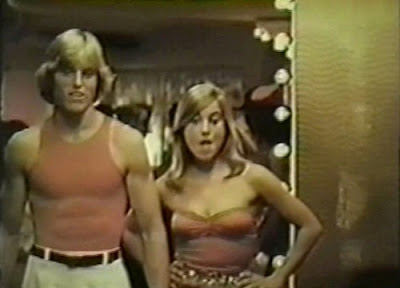 Predictable, yet completely necessary, the rivalry that forms between skaters Stanley (Greg Bradford) and Ace (Patrick Swayze) is the dominate storyline during those smallish chunks of time that exist in-between the film’s many musical numbers (the majority involving skate crews with names like, “New Horizons” and the “Hot Wheelers”). Egged on by Richie (Scott Baio), his bookie pal, and placated by his sister Susan (Maureen McCormick), Stan from the Valley must overcome the brash Ace, the leader of the West Side Wheelers, the toughest roller skating gang this side of Wilshire Boulevard, find out if Katherine Kelly Lang is real or not (she has the charisma of a fuck doll that’s never been inflated), use a shitload of poker metaphors in an argument, and partake in a game of chicken involving a rickety old pier and motorized roller skates.
Predictable, yet completely necessary, the rivalry that forms between skaters Stanley (Greg Bradford) and Ace (Patrick Swayze) is the dominate storyline during those smallish chunks of time that exist in-between the film’s many musical numbers (the majority involving skate crews with names like, “New Horizons” and the “Hot Wheelers”). Egged on by Richie (Scott Baio), his bookie pal, and placated by his sister Susan (Maureen McCormick), Stan from the Valley must overcome the brash Ace, the leader of the West Side Wheelers, the toughest roller skating gang this side of Wilshire Boulevard, find out if Katherine Kelly Lang is real or not (she has the charisma of a fuck doll that’s never been inflated), use a shitload of poker metaphors in an argument, and partake in a game of chicken involving a rickety old pier and motorized roller skates.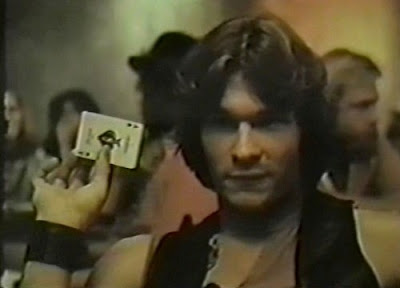 Employing his sycophantic underlings to sabotage his opponents (which include skaters with names like, Uncle Sam and Pistol Pete), even though he doesn’t have to (he kicks ass both in the singles and mixed doubles competition), Ace’s determination to win has severely clouded his judgment. The best example of this cloudiness can be observed whenever you would see Ace and his second in command Frankey (Ron Palillo) sitting together. While Ace’s lady-friend/skating partner is attractive and all, it was clear to me that gals leaning on each of Frankey’s bony shoulders were two of the hottest chicks in all of Skatetown, U.S.A. Or maybe Ace is just not that into leather-clad women who combine the elegance of Buckwild from Flavor of Love 2 and the wayward spunk of Polly from the movie Teen Witch. Either way, it’s his loss.
Employing his sycophantic underlings to sabotage his opponents (which include skaters with names like, Uncle Sam and Pistol Pete), even though he doesn’t have to (he kicks ass both in the singles and mixed doubles competition), Ace’s determination to win has severely clouded his judgment. The best example of this cloudiness can be observed whenever you would see Ace and his second in command Frankey (Ron Palillo) sitting together. While Ace’s lady-friend/skating partner is attractive and all, it was clear to me that gals leaning on each of Frankey’s bony shoulders were two of the hottest chicks in all of Skatetown, U.S.A. Or maybe Ace is just not that into leather-clad women who combine the elegance of Buckwild from Flavor of Love 2 and the wayward spunk of Polly from the movie Teen Witch. Either way, it’s his loss.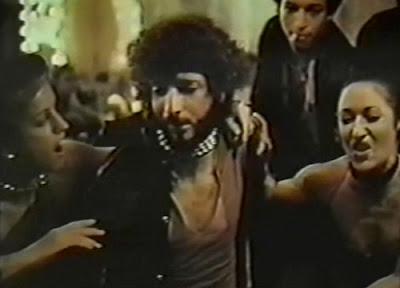 Sporting a studded dog collar and a churlish disposition (one that was downright unhorshackian at times), Ron Palillo’s henchmen character represented the ugly side of disco peer pressure. In constant fear of losing his place within the gang’s complex hierarchy, Frankey carries out his master’s orders without fail.
Sporting a studded dog collar and a churlish disposition (one that was downright unhorshackian at times), Ron Palillo’s henchmen character represented the ugly side of disco peer pressure. In constant fear of losing his place within the gang’s complex hierarchy, Frankey carries out his master’s orders without fail.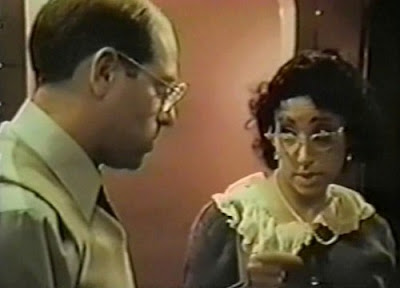 Meanwhile, over at the change rooms. The moment the word “pantyhose” rolled off her exquisite lips was the exact instant I knew the bespectacled Eleanor (Harlene Winsten) would be the Skatetown, U.S.A. character for me (she trips and falls before she even puts her skates on). Recently married to a nebbish clod named Irwin (David Landsberg), a man who clearly does not appreciate her inherent foxiness, Eleanor sets the disco floor on fire with her frumpy attire and spastic roller moves. Unfortunately, the winsome Miss Winsten only appears sporadically throughout the film. Nevertheless, I treasured every scene of hers like it were a rare gift from the roller disco movie gods.
Meanwhile, over at the change rooms. The moment the word “pantyhose” rolled off her exquisite lips was the exact instant I knew the bespectacled Eleanor (Harlene Winsten) would be the Skatetown, U.S.A. character for me (she trips and falls before she even puts her skates on). Recently married to a nebbish clod named Irwin (David Landsberg), a man who clearly does not appreciate her inherent foxiness, Eleanor sets the disco floor on fire with her frumpy attire and spastic roller moves. Unfortunately, the winsome Miss Winsten only appears sporadically throughout the film. Nevertheless, I treasured every scene of hers like it were a rare gift from the roller disco movie gods.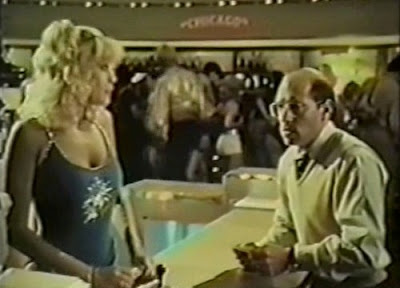 Half-heartedly spouting feminist slogans when confronted, a more wide-eyed than usual Judy Landers (Dr. Alien) tries her best to figure out the club’s simplistic ticketing system as Tery, Skatetown’s breathy doorperson. (Remember kids: Orange passes are for last week, green passes are for this week, and free tickets cost five dollars.) Sadly, Judy spends the majority of the film sitting behind Skatetown’s ticket counter; I would have loved to have seen her skate.
Half-heartedly spouting feminist slogans when confronted, a more wide-eyed than usual Judy Landers (Dr. Alien) tries her best to figure out the club’s simplistic ticketing system as Tery, Skatetown’s breathy doorperson. (Remember kids: Orange passes are for last week, green passes are for this week, and free tickets cost five dollars.) Sadly, Judy spends the majority of the film sitting behind Skatetown’s ticket counter; I would have loved to have seen her skate.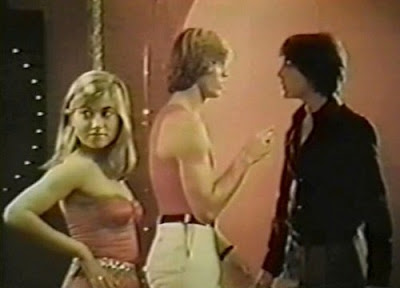 I liked how Maureen McCormick (The Brady Bunch), head-to-toe in pink, would disappear on occasion. Which makes sense, since, according to her memoir: Here’s the Story: Surviving Marcia Brady and Finding My True Voice in Maui, she was doing a lot of cocaine during the making of the film, and, as we all know, cocaine enthusiasts aren’t exactly the most reliable people when it comes to truancy. Coked up or not, Maureen looked amazing in her tight pink short shorts, and her character’s sexual attraction to Ron Palillo, while strange and slightly off-putting, gave hope to millions of deluded dirtbags the world over. Oh, and I loved the empty-headed, trollopy manner in which she chewed her gum.
I liked how Maureen McCormick (The Brady Bunch), head-to-toe in pink, would disappear on occasion. Which makes sense, since, according to her memoir: Here’s the Story: Surviving Marcia Brady and Finding My True Voice in Maui, she was doing a lot of cocaine during the making of the film, and, as we all know, cocaine enthusiasts aren’t exactly the most reliable people when it comes to truancy. Coked up or not, Maureen looked amazing in her tight pink short shorts, and her character’s sexual attraction to Ron Palillo, while strange and slightly off-putting, gave hope to millions of deluded dirtbags the world over. Oh, and I loved the empty-headed, trollopy manner in which she chewed her gum. Shooting laser beams from his fingers and promoting the joint’s nasty snack bar whenever possible, The Wizard (Denny Johnston), the skate palace’s mystical DJ (he can make crooner Dave Mason appear and disappear at will), spins a groove-tastic array of killer disco tracks. My faves being: the totally awesome “Born To Be Alive” by Patrick Hernandez (it’s the song that introduces us the shimmering universe that is Skatetown, U.S.A.); Heatwave‘s “Boogie Nights;” “Macho Man” by the Village People (a song I always associate with roast beef and Yorkshire pudding); a cover of The Rolling Stones‘ “Under My Thumb” by the Hounds (Patrick Swayze and April Allen destroy all comers to this song); and, of course, Earth, Wind and Fire‘s “Boogie Wonderland.”
Shooting laser beams from his fingers and promoting the joint’s nasty snack bar whenever possible, The Wizard (Denny Johnston), the skate palace’s mystical DJ (he can make crooner Dave Mason appear and disappear at will), spins a groove-tastic array of killer disco tracks. My faves being: the totally awesome “Born To Be Alive” by Patrick Hernandez (it’s the song that introduces us the shimmering universe that is Skatetown, U.S.A.); Heatwave‘s “Boogie Nights;” “Macho Man” by the Village People (a song I always associate with roast beef and Yorkshire pudding); a cover of The Rolling Stones‘ “Under My Thumb” by the Hounds (Patrick Swayze and April Allen destroy all comers to this song); and, of course, Earth, Wind and Fire‘s “Boogie Wonderland.”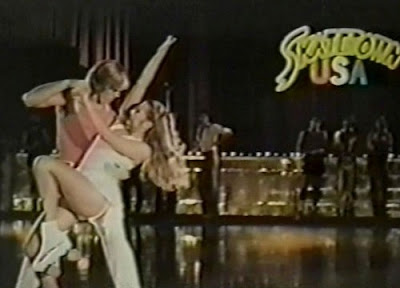 It’s hard to believe, but in 1979, a straight man could wear a pink tank top with white slacks while performing an elaborate roller skating routine (complete with muscle flexing) to the strains of “Macho Man” without an ounce of fear. Anyway, I sure am glad I finally got the chance to visit Skatetown, U.S.A. The only downside being that I reek of flat 7Up and soggy pizza.
It’s hard to believe, but in 1979, a straight man could wear a pink tank top with white slacks while performing an elaborate roller skating routine (complete with muscle flexing) to the strains of “Macho Man” without an ounce of fear. Anyway, I sure am glad I finally got the chance to visit Skatetown, U.S.A. The only downside being that I reek of flat 7Up and soggy pizza.video uploaded by deadenddrivein
…
